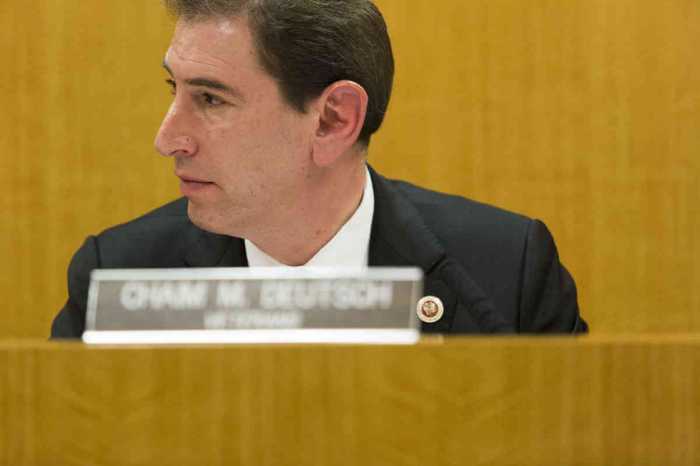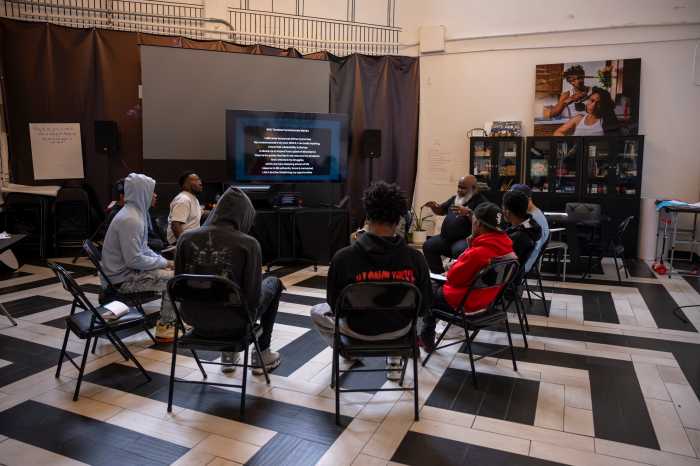Governor Andrew Cuomo used the occasion of the Empire State Pride Agenda’s annual Manhattan fall dinner to announce new regulations that will provide anti-discrimination protections in employment, housing, public accommodations, and access to credit for transgender New Yorkers.
The regulations will come from the New York State Division of Human Rights, which has authority to interpret the state’s Human Rights Law, first enacted in 1945. The new regulations, which will be published on November 4 and then be subject to a 45-day public comment period before taking effect, will define discrimination on the basis of gender identity or expression as sex discrimination long outlawed by New York statute.
“As governor of the State of New York,” Cuomo told more than 600 guests at the October 22 ESPA event at the Sheraton New York in Midtown, “it is my opinion that in 2015 it is clear that the fair legal interpretation of the definition of a person’s sex includes gender identity and gender expression.”
Sex, disability anti-bias provisions apply to bias based on gender identity, expression, governor says
The regulations also spell out that discrimination based on “gender dysphoria” –– defined medically as having a gender identity different from the sex assigned at birth –– is discrimination based on disability, also a protected class under New York Human Rights law.
“It is a sweet victory, indeed,” the governor continued. “New York law will be the most sweeping in the nation… Our law covers it all.”
In a written release, Cuomo’s office asserted that his action represented “the first time that any governor has issued statewide regulations to prohibit harassment and discrimination on the basis of gender identity, transgender status, or gender dysphoria,” a claim confirmed by Mara Keisling, executive director of the National Center for Transgender Equality (NCTE). In his remarks at the dinner, the governor emphasized that the regulations apply to all types of employment, not merely public sector jobs.
Cuomo’s action ends a logjam that has existed for nearly 13 years since the Legislature enacted a gay rights law that did not include protections based on gender identity or expression. Advocates have been frustrated since then in winning approval for GENDA, the Gender Expression Non-Discrimination Act. Though the measure has gotten a favorable vote repeatedly since 2007 in the heavily Democratic State Assembly, the State Senate, controlled in most recent years by the Republicans, has only once allowed the bill even committee consideration. In 2010, when the Democrats were in charge, GENDA was narrowly rejected by the Judiciary Committee when Bronx Democratic Senator Ruben Diaz, Sr., sided with a unanimous bloc of GOP senators in voting “no.”
Chelsea Democratic State Assemblymember Dick Gottfried, who has steered GENDA to successive favorable votes, praised Cuomo’s action in a written statement, saying, “Governor Cuomo’s executive action to interpret New York’s Human Rights Law to cover transgender discrimination is a major step for dignity for all.” Then pointing to a 2012 conclusion regarding the status of anti-transgender discrimination claims under federal law made by the US agency responsible for employment rights enforcement, Gottfried added, “It follows the federal Equal Employment Opportunity Commission’s decision several years ago to treat transgender discrimination as a form of sex discrimination.”
Daniel Squadron, the Lower Manhattan-Brownstone Brooklyn Democrat who sponsors GENDA in the Senate, said, “This is a big step to correct one of the state’s great injustices. Transgender New Yorkers will now have more confidence that discrimination in homes, jobs, and public accommodations will not be tolerated.”
Senator Brad Hoylman, an out gay Democrat who covers a broad swath of Midtown and Lower Manhattan, said of Cuomo’s action, “It is extremely comprehensive. It covers the vast majority of the things we were concerned about in GENDA.”
One component of GENDA that Cuomo’s order does not implement, however, is protections for transgender New Yorkers under the state’s 2000 hate crimes statute, which does not fall under the purview of New York’s Human Rights Law. Gottfried, in his statement, took note of that, saying, “District attorneys should apply this interpretation to apply New York’s hate crimes law to anti-transgender violence.”
In fact, in the 15 years since the hate crimes law took effect, some prosecutors have said they believe that crimes in which victims are targeted based on their gender identity and expression are covered under the statute, a position that Eliot Spitzer publicly endorsed when he was the state attorney general at the time the law was enacted.
Both Hoylman and Gottfried said that regardless of Cuomo’s action, it was important to keep pressing GENDA in the Legislature in order to “codify” the regulations being put in place.
“The State Senate is not off the hook,” Gottfried said. “They should still pass my GENDA bill so this protection cannot be removed by a future governor’s interpretation.”
Squadron took a somewhat different tack on that question, seemingly reluctant to raise any doubts about the comprehensiveness or finality of Cuomo’s action. Asked what the strategy on GENDA going forward would be, he responded, “We are still looking at it and having conversations. This appears to be quite significant and difficult to undo. I am a legislator and would prefer to always do it through legislation, and doing so that way sends a strong message to the community.”
Squadron's point that enacting explicit protections through legislation has a valuable impact in educating the public was echoed by NCTE's Keisling, who said, “Passing GENDA is still necessary and urgent, because employers and businesses must be aware of the law.”
For both Squadron and Hoylman, one clear implication of Cuomo’s action was the importance of Democrats’ gaining control of the Senate, where the GOP currently holds a 32-31 edge, in next year’s elections.
“It’s a shame that we have a Republican Senate that if legislation arrives that has reference to LGBT, it is DOA,” Hoylman said. “Republicans see it as radioactive.”
Cuomo’s action, he added, was “courageous and creative.” Hoylman predicted the governor would now likely face “backlash from Senate Republicans.”
Legislators and advocates were disinclined to place any significance on the question of whether Cuomo’s “courageous” action could have come sooner.
Nathan Schaefer, executive director of the Empire State Pride Agenda, arguing that Cuomo is the first state governor in the US to have taken this kind of step, said, “So it’s hard to say when it could have been done.”
Alphonso David, a former Lambda Legal attorney who is counsel to the governor, explained that the push for the new regulations began in August, when Cuomo, “really frustrated” at the Senate’s continued refusal to pass GENDA, called together his top advisors.
“In 2015, that is not acceptable,” David said the governor told the group. “How can we fix this?”
David explained that the administration was able to move forward now because of “recent development around case law” in New York, but the cases he pointed to date back a decade and more.
Hayley Gorenberg, Lambda Legal’s deputy legal director, characterized Cuomo’s action as falling within a gradually evolving view of discrimination based on gender identity and expression being a form of sex discrimination.
“We’re really pleased that we have momentum that sex discrimination includes discrimination based on a person’s gender identity and expression,” she said. “While we’re pleased that that interpretation has been gaining traction, having clear direction that names people and their characteristics is preferred.”
Cuomo’s action, she said, would help “educate institutions and employers.”
As early as 1989, the US Supreme Court, in a case involving a woman denied partnership at Price Waterhouse because she was viewed as insufficiently feminine, ruled that discrimination based on a person’s nonconformity to sex stereotypes could be viewed as sex discrimination.
Broader application of that principle to include anti-transgender discrimination across the board, however, has evolved only slowly. It was just three years ago that the EEOC came to that conclusion regarding federal law, and federal courts have not yet embraced that interpretation universally.
According to Matt Foreman, who was executive director of the Pride Agenda when the gay rights law was passed in 2002, the group received an advisory opinion from one legal advocacy group arguing that transgender New Yorkers were already protected by the state Human Rights Law’s ban on sex discrimination. When ESPA’s leaders subsequently met with then-Attorney General Spitzer urging him to issue an advisory opinion with the same conclusion, Foreman recalled, they were greeted cordially, “but the requested opinion was never produced” –– despite Spitzer’s willingness to speak out on the applicability of the hate crimes law to the transgender community.
Schaefer, ESPA’s current leader, credits Cuomo for being ahead of the curve.
“He has proven to be a champion of LGBT New Yorkers for years, and he once again he proved that last night,” he said.
ESPA only learned the full details of the governor's planned announcement regarding the new regulations at 4 p.m. the day of the dinner, about the time that the New York Times broke the story, Schaefer said, though the group had been working on the issue with the administration for some months.
For Melissa Sklarz, a transgender activist who has been in the GENDA fight since day one and is now the co-chair of the ESPA board, Cuomo’s action was in fact “sweet,” but she also knows there’s plenty more work to do.
“Now it’s up to us as a community,” she said. “We have what we’ve been pushing for but cultural change takes more time. We have to show up and do the work in our own lives to show people that trans lives matter.”




































